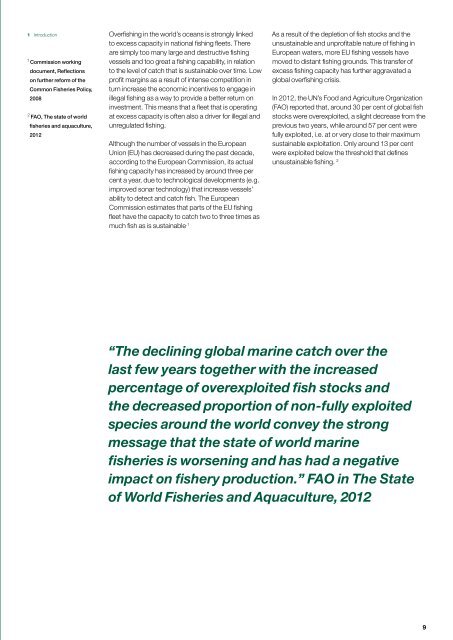"Exporting Exploitation" - "Export der Ausbeutung ... - Greenpeace
"Exporting Exploitation" - "Export der Ausbeutung ... - Greenpeace
"Exporting Exploitation" - "Export der Ausbeutung ... - Greenpeace
You also want an ePaper? Increase the reach of your titles
YUMPU automatically turns print PDFs into web optimized ePapers that Google loves.
1Introduction<br />
1<br />
Commission working<br />
document, Reflections<br />
on further reform of the<br />
Common Fisheries Policy,<br />
2008<br />
2<br />
FAO, The state of world<br />
fisheries and aquaculture,<br />
2012<br />
Overfishing in the world’s oceans is strongly linked<br />
to excess capacity in national fishing fleets. There<br />
are simply too many large and destructive fishing<br />
vessels and too great a fishing capability, in relation<br />
to the level of catch that is sustainable over time. Low<br />
profit margins as a result of intense competition in<br />
turn increase the economic incentives to engage in<br />
illegal fishing as a way to provide a better return on<br />
investment. This means that a fleet that is operating<br />
at excess capacity is often also a driver for illegal and<br />
unregulated fishing.<br />
Although the number of vessels in the European<br />
Union (EU) has decreased during the past decade,<br />
according to the European Commission, its actual<br />
fishing capacity has increased by around three per<br />
cent a year, due to technological developments (e.g.<br />
improved sonar technology) that increase vessels’<br />
ability to detect and catch fish. The European<br />
Commission estimates that parts of the EU fishing<br />
fleet have the capacity to catch two to three times as<br />
much fish as is sustainable .1<br />
As a result of the depletion of fish stocks and the<br />
unsustainable and unprofitable nature of fishing in<br />
European waters, more EU fishing vessels have<br />
moved to distant fishing grounds. This transfer of<br />
excess fishing capacity has further aggravated a<br />
global overfishing crisis.<br />
In 2012, the UN’s Food and Agriculture Organization<br />
(FAO) reported that, around 30 per cent of global fish<br />
stocks were overexploited, a slight decrease from the<br />
previous two years, while around 57 per cent were<br />
fully exploited, i.e. at or very close to their maximum<br />
sustainable exploitation. Only around 13 per cent<br />
were exploited below the threshold that defines<br />
unsustainable fishing. 2<br />
“The declining global marine catch over the<br />
last few years together with the increased<br />
percentage of overexploited fish stocks and<br />
the decreased proportion of non-fully exploited<br />
species around the world convey the strong<br />
message that the state of world marine<br />
fisheries is worsening and has had a negative<br />
impact on fishery production.” FAO in The State<br />
of World Fisheries and Aquaculture, 2012<br />
9
















